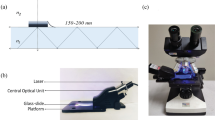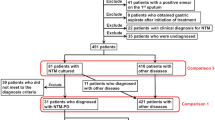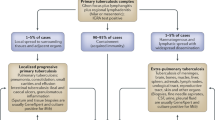Abstract
ORGANISMS of the genus Mycoplasma are frequent inhabitants of the female genital tract. A common species is Mycoplasma hominis type I, and this organism has been isolated from about 20 per cent of normal women1.
This is a preview of subscription content, access via your institution
Access options
Subscribe to this journal
Receive 51 print issues and online access
$199.00 per year
only $3.90 per issue
Buy this article
- Purchase on Springer Link
- Instant access to full article PDF
Prices may be subject to local taxes which are calculated during checkout
Similar content being viewed by others
References
Nicol, C. S., and Edward, D. G. ff., Brit. J. Vener. Dis., 29, 141 (1953).
Clyde, W. A., J. Immunol., 92, 958 (1964).
Koss, L. C., and Durfee, G. R., in Diagnostic Cytology (Pitman, London, 1961).
Munguia, H., Franco, E., and Valenzuela, P., Amer. J. Obstet. and Gynec., 94, 181 (1966).
Ford, D. K., and DuVernet, M., Brit. J. Vener. Dis., 39, 18 (1963).
Paton, G. R., Jacobs, J. P., and Perkins, F. T., Nature, 207, 43 (1965).
Spriggs, A. I., Boddingham, M. M., and Clarke, C. M., Lancet, i, 1383 (1962).
Author information
Authors and Affiliations
Rights and permissions
About this article
Cite this article
JONES, D., DAVSON, J. Mycoplasma hominis in Ayre's Smears. Nature 213, 828–829 (1967). https://doi.org/10.1038/213828a0
Issue Date:
DOI: https://doi.org/10.1038/213828a0
Comments
By submitting a comment you agree to abide by our Terms and Community Guidelines. If you find something abusive or that does not comply with our terms or guidelines please flag it as inappropriate.



